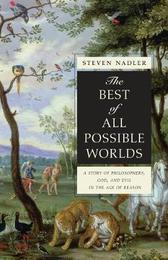
|
The Best of All Possible Worlds: A Story of Philosophers, God, and Evil in the Age of Reason
Paperback / softback
Main Details
| Title |
The Best of All Possible Worlds: A Story of Philosophers, God, and Evil in the Age of Reason
|
| Authors and Contributors |
By (author) Steven Nadler
|
| Physical Properties |
| Format:Paperback / softback | | Pages:320 | | Dimensions(mm): Height 216,Width 140 |
|
| Category/Genre | Western philosophy - c 1600 to c 1900 |
|---|
| ISBN/Barcode |
9780691145310
|
| Classifications | Dewey:214.09032 |
|---|
| Audience | | Tertiary Education (US: College) | | Professional & Vocational | |
|---|
|
Publishing Details |
| Publisher |
Princeton University Press
|
| Imprint |
Princeton University Press
|
| Publication Date |
4 April 2010 |
| Publication Country |
United States
|
Description
In the spring of 1672, German philosopher and mathematician Gottfried Wilhelm Leibniz arrived in Paris, home of France's two greatest philosopher-theologians of the period, Antoine Arnauld and Nicolas de Malebranche. Their meeting represents an important moment. This work focuses on relationships between these brilliant and resolute individuals.
Author Biography
Steven Nadler is the William H. Hay II Professor of Philosophy at the University of Wisconsin-Madison. He is the author of "Rembrandt's Jews", a finalist for the 2004 Pulitzer Prize, as well as "Spinoza: A Life" and "Spinoza's Heresy".
Reviews"The centerpiece of this intellectual history is a vicious late 17th-century debate between three unlikely combatants... Nadler's superb study makes for a larger space for Leibniz, Malebranche, and Arnauld alongside such giants of the period as Descartes and Spinoza."--Publishers Weekly "I can't imagine a better guide to 17th-century philosophical thought."--Michael Dirda, Washington Post Book World "Why did a loving God create a world marred by so much evil? In three seventeenth-century intellectuals who wrestled with this question, Nadler recognizes how a single inquiry can profoundly engage markedly different minds."--Bryce Christensen, Booklist "Nadler knows as much about Spinoza and Malebranche as any man alive, and enough about Arnauld and Leibniz to engage at need with detailed issues of scholarship. He is a serious scholar at the peak of his powers... What he has given us here is a wonderfully vivid and lifelike portrait of one of the great debates that dominate Early Modern Philosophy, the echoes of which continue to reverberate down the ages."--Andrew Pyle, Metascience "Nadler's remarkably accessible comparative analysis of these difficult seventeenth-century concepts and flights of theological speculation shows us the deep grammar of our times."--Jeffrey T. Zalar, European Legacy
|